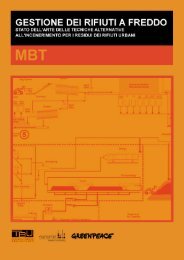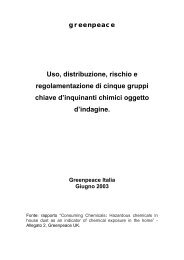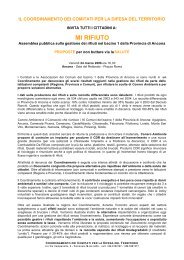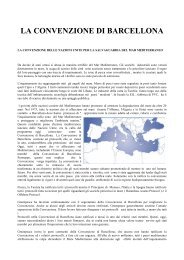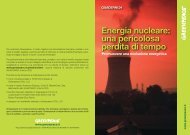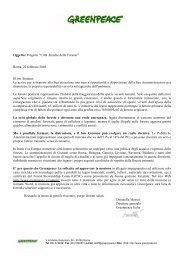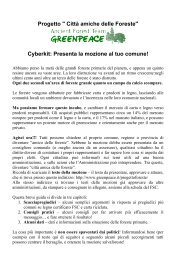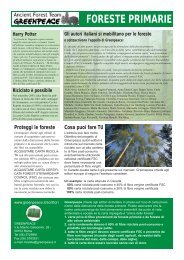Zero Waste by Robin Murray, Greenpeace Environmental Trust 2002
Zero Waste by Robin Murray, Greenpeace Environmental Trust 2002
Zero Waste by Robin Murray, Greenpeace Environmental Trust 2002
You also want an ePaper? Increase the reach of your titles
YUMPU automatically turns print PDFs into web optimized ePapers that Google loves.
C u rre n t l y, waste disposal authorities (other than unitary<br />
authorities) have no interest in the expansion of re c y c l i n g<br />
<strong>by</strong> collection authorities or community groups because they<br />
a re re q u i red to pay the incremental disposal savings to the<br />
collector in the form of a recycling credit. An urgent task of<br />
policy is to re s t o re an incentive to disposal authorities.<br />
There are the following possibilities:<br />
• a rebate of landfill tax to disposal authorities on<br />
tonnages equal to those on which they have paid<br />
recycling credits;<br />
• a graduated landfill tax with low rates for base<br />
volumes, and rising rates to marginal levels as high as<br />
£45 a tonne. This is a variant of the Wallonia model<br />
where the regional government offers zero tax<br />
landfilling for a proportion of residual waste, and then<br />
a high marginal rate. The landfill tax could be<br />
extended to a disposal tax <strong>by</strong> giving rebates for pretreated<br />
waste, scaled to reflect the environmental<br />
benefits of the treatment option;<br />
• the replacement of Disposal Authority precepts based<br />
on council tax charges <strong>by</strong> a charge per tonne. This<br />
measure would be aimed at disposal authorities owned<br />
<strong>by</strong> constituent boroughs (such as those in London,<br />
Merseyside and Greater Manchester) and would apply<br />
‘the polluter pays’ principle to the funding of disposal<br />
authorities. A change of this kind would involve one<br />
or more of the constituent authorities suffering a loss,<br />
which the government should offer to fund on a fouryear<br />
tapering basis while the losers increase their rate<br />
of waste diversion;<br />
• the combining of collection and disposal functions in a<br />
unitary <strong>Waste</strong> Minimisation Authority charged with<br />
advancing the government’s strategy and achieving the<br />
targets within the area concerned.<br />
3. Finance<br />
Lack of finance is the main disincentive to collection<br />
authorities expanding composting and recycling schemes. At<br />
any committee meeting, waste hearing or public discussion<br />
on recycling, both councillors and officers will cite<br />
p roblems of funding and markets (which is another way of<br />
talking about finance) as the two reasons why they cannot<br />
at the moment proceed furt h e r. In local government term s ,<br />
this is a budget rather than a price disincentive.<br />
The main counterweight has been provided <strong>by</strong> local<br />
pressure on politicians. As a general rule, an incinerator<br />
proposal in any borough or district will increase local<br />
resources devoted to recycling. This may be enough to<br />
encourage some pioneers: it is not adequate to fund a<br />
countrywide transition. If collection authorities are to<br />
promote intensive recycling, then they, too, need access to<br />
transition finance, on terms that outweigh the<br />
disincentives to change.<br />
There are two issues:<br />
• the demand for funds (the requirements of transition<br />
finance)<br />
• the source of funds<br />
(a) the demand for funds<br />
In the long run, landfill and other disposal taxes should be<br />
set at a level that makes efficient recycling and composting<br />
competitive with mixed waste disposal. The waste<br />
industry has estimated the incremental cost of running<br />
kerbside recycling schemes at £10 per household, which<br />
(assuming an initial collection of 140kg per household<br />
annually) equates to £70 a tonne, and a similar amount<br />
could be assumed for organic collections. With existing<br />
costs of landfill-oriented waste management at £50-£60 a<br />
tonne, this suggests that the landfill tax that is set to rise<br />
to £15 a tonne <strong>by</strong> 2004 should be doubled in order to<br />
150<br />
<strong>Zero</strong> <strong>Waste</strong><br />
152



